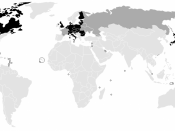The Brazilian involvement in Kyoto and beyondIntroductionBrazil was my portion of the Kyoto debate. Before this assignment, I knew very little knowledge of the Kyoto agreement and I knew even less about Brazil's position on the Kyoto accord and its position on global climate change. Through the research that I have done and through the discussions with my colleagues, I found Brazil unique insomuch that they are a developing country however, they have implemented countless environmental or green friendly industries. The majority of which at the very least are encouraged by the government if not ran by government itself. Moreover, Brazil is unique because the Amazon rainforest provides for a "sink" because it absorbs massive amounts of the Carbon Dioxide from the atmosphere. Another interesting fact that is that is distinctive of a Brazil alone is that of the industrialized and developing countries that mostly pollute due to their energy sectors, Brazil contributes very little via their energy sector emissions.
Incidentally, Brazil's unsustainable land use and deforestation contribute predominantly to Brazil's emissions of greenhouse gases.
Brazil's Stance on KyotoBrazil's reasoning for not becoming a member of the Kyoto treaty is a rather sophisticated argument that is very sound and one that is based on factual history. Furthermore, Brazil asserts that climate change is determined more by the aggregation of greenhouse gases in the atmosphere than by annual emissions, primarily because the most important greenhouse gas carbon dioxide lingers in the atmosphere for more than a century. However, Brazil has not ignored Kyoto's purpose because they have demonstrated that they are pro-active in fighting global climate change. Under Kyoto, highly industrialized countries obliged to reduce greenhouse gases can invest in emissions reducing projects in developing countries as an alternative to changing their production methods at home. Fortunately, for Brazil they have...


